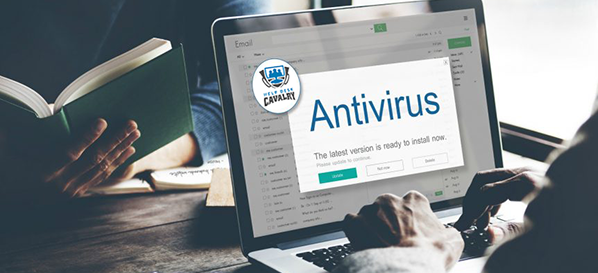If you lived in a bad area, would you leave the front door to your house unlocked? Of course not! When it comes to the “house” that your data is stored in (i.e. your computer), you can think of the internet as one huge bad neighborhood, and no computer that’s connected to it is automatically safe. Even if you actively avoid shady websites and practice safe computing habits, you can still become the victim of a virus attack since attackers don’t wait to be invited. Instead, they go from door to door, checking which users don’t prevent unwanted persons from entering into their digital mansions, where they keep large quantities of sensitive data.
Installing antivirus software is sort of like hiring a security guard to stand at the gate and protect your computer—as well as the network the computer is connected to—from strangers with malicious intentions.
Top Reasons Why Everyone Needs Antivirus Software
Here are some of the most important reasons why absolutely everyone needs reliable antivirus software on every computer (and mobile device) connected to the internet:
1. No Computer Is Immune to Viruses
Regardless of which operating system or applications you use, you’re never immune to viruses because all software contains vulnerabilities that can be exploited by attackers. After all, software is created by humans. In many cases, these vulnerabilities are discovered by attackers way before those interested in lessening them learn about their existence. That’s why even properly configured systems with every available patch can be compromised.
Antivirus software uses many sophisticated methods, including heuristics, sandboxing, and machine learning, to identify unknown viruses and stop them dead in their tracks, making it an indispensable first line of defense that no computer can afford to be without.
2. All Users Make Mistakes
Tech-savvy users sometimes believe that antivirus software is unnecessary because they know how to use computers safely and avoid viruses. This is unfortunately wrong. This attitude can have disastrous consequences because even the most skilled users sometimes make mistakes, which explains why 90 percent of data breaches are caused by human error.
When antivirus software is installed on each and every computer, a small lapse in concentration or moving too fast to meet a deadline is much less likely to result in a costly data breach. That’s because important safety-related decisions are made automatically in the background.
3. Your Reputation Is on the Line
Virus attacks can have many negative consequences, and reputation damage is definitely among them. There are many viruses that hijack computers and other devices connected to the same network and use them to conduct illegal activities, such as sending out spam messaging or launching denial-of-service attacks to overwhelm a targeted server with traffic.
Leading antivirus software guards against these and other attacks by offering additional internet security features, including cloud-based behavior analysis, firewall, virtual private network, and comprehensive email protection, just to give a few examples.
4. Viruses Lead to Costly Downtime
While reliable antivirus software does exist (Windows Defender is a great example), it’s true that best-in-class enterprise solutions are not cheap. What’s also not cheap, however, is the downtime that virus attacks unavoidably lead to. For small and medium-sized businesses, the average cost of an hour of downtime is estimated to be approximately $10,000, and this number doesn’t even include the long-term financial impact of a damaged reputation on a business.
When you compare the cost of an hour of downtime with the cost of a monthly or annual antivirus subscription, it becomes easy to see just how much financial sense virus protection makes, both immediately and in the long run.
5. Antivirus Software Doesn’t Protect Only Against Viruses
Technically speaking, viruses are just one of many types of malicious software that can infect a computer or network. Other dangerous threats include:
- Rootkits: Software that enables privileged access to a computer while actively hiding its presence.
- Adware: Revenue-generating malicious programs that hide on a computer and display advertisements.
- Spyware: Applications that aim to gather sensitive information about a person or organization.
- Trojans: Malicious software disguised as legitimate software.
- Worms: Programs that replicate themselves to spread to other computers and networks.
- Ransomware: A type of malicious software that encrypts a victim’s files and demands a ransom for unlocking them.
Capable antivirus software can protect users against these and other threats, providing comprehensive protection in a single package.
The idea that antivirus software is nothing but a safety net for irresponsible users doesn’t consider the reality of modern cybercrime. Attackers choose their victims proactively based on how their security is set up, and they use increasingly sophisticated tactics. The race to build a more comprehensive antivirus will always be matched by those who want to defeat them. Luckily the best antivirus software is always adjusting to changes in cybercrime and your product is updated is regularly.
As a HDCav client, your machines and networks will already be loaded with the best antivirus software available. And you’ll have a team of security experts ensuring it’s always up to date and running at optimal levels. If you’d like to learn more about our cybersecurity planning and how we can be the frontline of safety for your organization, just contact us. It only takes a few minutes to walk you through the process.

